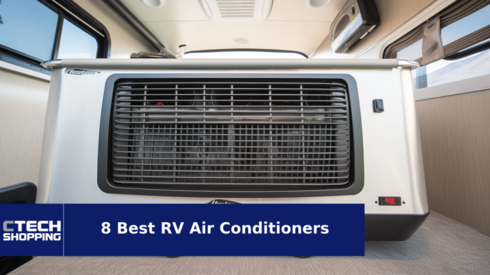
The Best RV Air Conditioners of 2024: Reviewed
The Best RV Air Conditioners of 2024: Reviewed
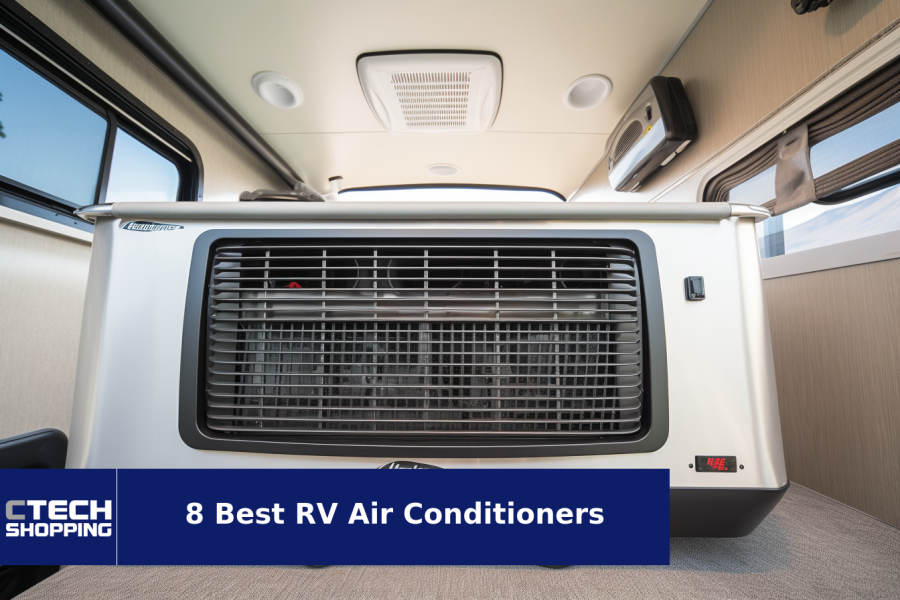
The reviews of the products in this article are created by a team of experts that is independent from CTech's editorial team. If you make a purchase through the links mentioned below, we may receive a commission.
Our Top Picks
Imagine a scorching summer day, and you're cruising down the highway in your RV. The open road is thrilling, but the sweat trickling down your back is certainly not. Thankfully, you can escape the heat with a reliable RV air conditioner. We know it's not just about beating the heat; it's also about quiet operation, energy efficiency, and reliability. To ensure that you get the best option, we’ve reviewed a number of RV air conditioners, comparing specs, scrutinizing user reviews, and weighing the pros and cons. Our review process has helped us select some of the best options out there. Check out our top picks below.
1 . Dometic RV Air Conditioner
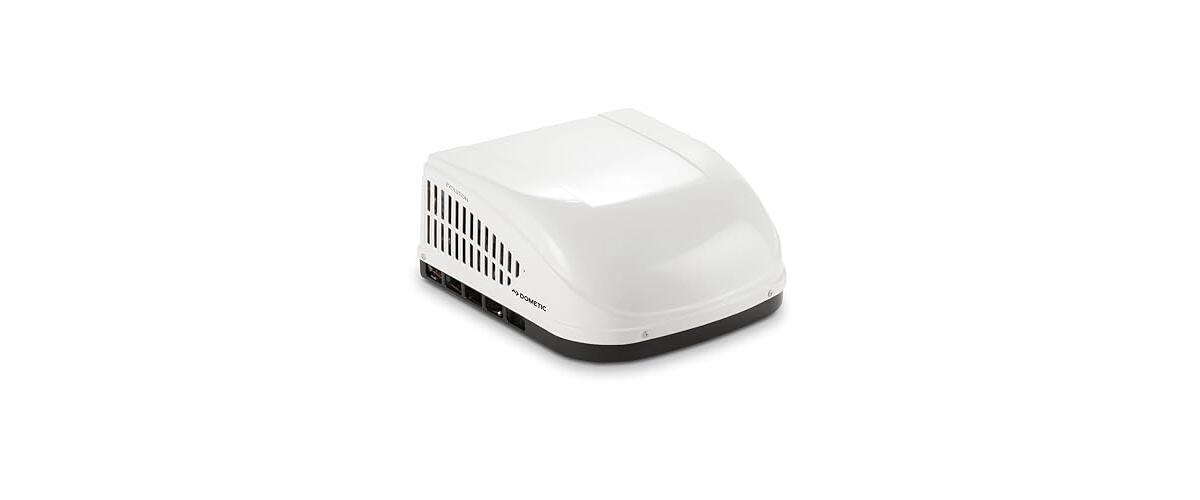

This RV air conditioner tops our list with its excellent cooling efficiency, thanks to its high-performance design with larger air openings that significantly improve airflow. The unit is lighter than many of its competitors due to its EPP foam housing, which not only helps in cooling efficiency but also reduces drag and potentially increases gas mileage when on the move. The custom wrap-around shroud and carbon steel base add to its durability, making it perfect for long-term use. When it comes to installation, this unit is extremely easy to install. Keep your vehicle cool all day long with this exceptional air conditioner!
Pros
Larger air openings enhance cooling performance, EPP foam housing for lightweight design, Smaller carbon footprints
Cons
Operation is a little bit loud.

2 . Coleman RV Air Conditioner
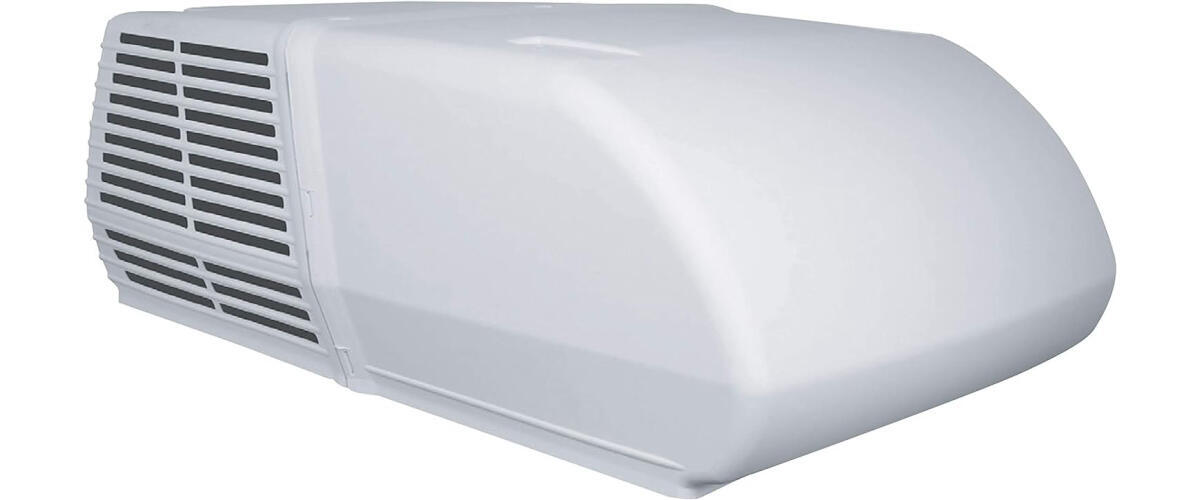

This RV air conditioner caught my attention for its robust features and eco-friendly credentials. Known as America's over-the-road bestseller, it stands out and is renowned for its powerful cooling capability and reliability. It is charged with the eco-friendly R-410A refrigerant which makes it a responsible choice for environmentally conscious RV owners. It offers a cooling capacity of 13,500 BTUH and delivers an impressive 320 CFM airflow.
Not just that, this unit is also equipped with large evaporator and condenser coils with raised lance fins that enhance its ability to dissipate heat efficiently. You can also upgrade it with an optional heater assembly, which provides an additional 5,600 BTUH of heat for those cooler adventures. This makes it an excellent year-round option for traveling in diverse climates.
Pros
Powerful performance with 13, 500 BTUH cooling capacity, Versatile heating options, Durable construction with all-copper tubing
Cons
Heavy unit can be difficult to get onto the roof

3 . ASA Electronics RV Air Conditioner – ACM 135
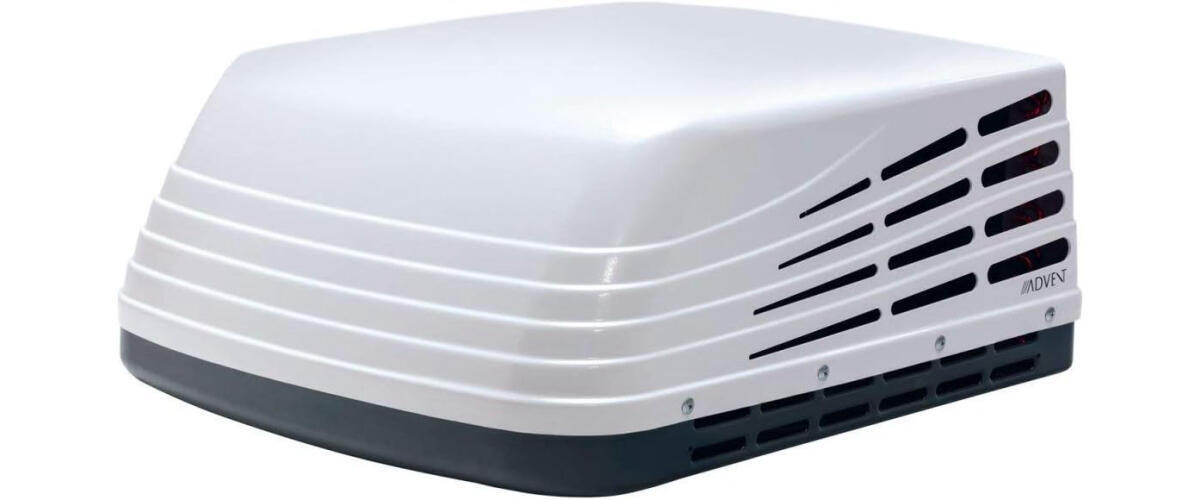

Continuing with our series on RV air conditioners, the third product on the list comes without hurting the pocket. This pick is known for its robust construction and efficient cooling capabilities, making it a popular choice among RV enthusiasts. It offers three fan speeds, allowing you to customize the speed according to your needs. Just like the previous model, this air conditioner also offers a cooling power of 13,500 BTUs and operates on 115 Volt AC power. It installs into a standard 14.25 x 14.25-inch vent opening, making it a versatile option for many RV models.
Pros
Powerful cooling capacity, Metal base pan & premium sealing components, Optional heating element adds versatility
Cons
May come with installation challenges

4 . RecPro RV Air Conditioner
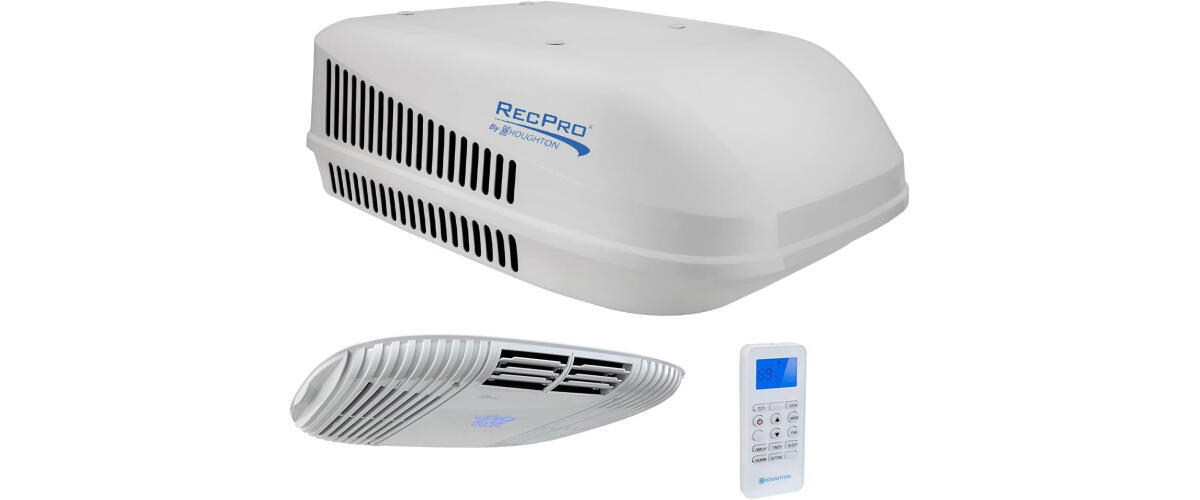

This RV air conditioner is a bit pricey but does not compromise on cooling your camper, travel trailer, fifth wheel, food truck, or motor home. It stands out with its dual heating and cooling capabilities, energy-efficient design, and exceptionally quiet operation. Apart from its robust 15,000 BTU capacity, what makes this unit particularly appealing is its low amp draw, allowing you to enjoy a cool or warm environment without overloading your RV’s electrical system. The air conditioner also includes a dehumidifying function, which is a godsend for maintaining a comfortable and fresh interior, especially in muggy weather conditions. With its dual heating and cooling capabilities, low energy consumption, and ease of installation, it offers a comprehensive solution to RV climate control.
Pros
Offers both cooling and heating options, Provides energy efficiency, Dehumidifying feature
Cons
Relatively expensive

5 . RecPro RV Air Conditioner - 13.5K Ducted (White)
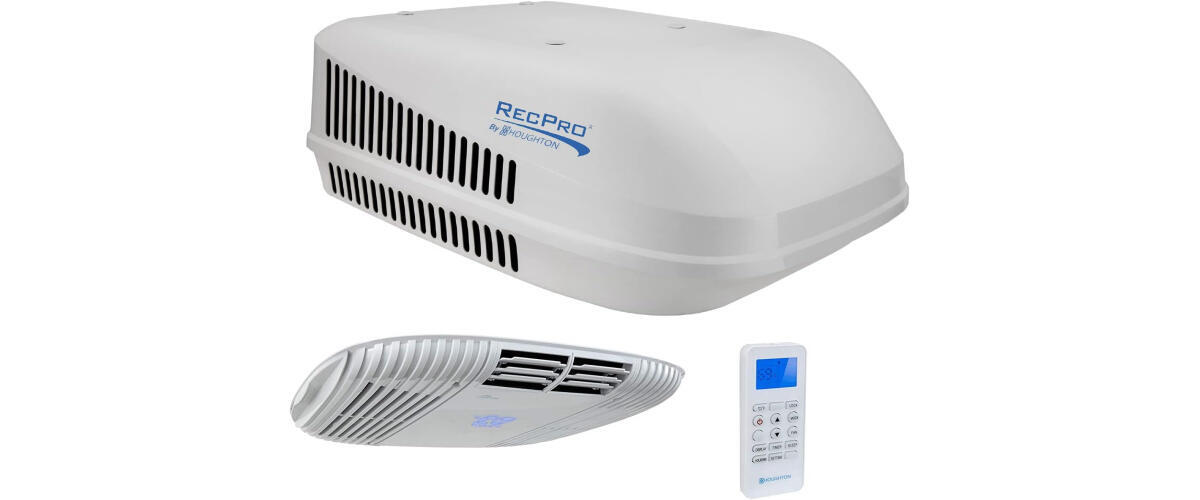

This product on our list is known for its low energy consumption. With its 110-120V power requirement and cooling-only functionality, it promises to deliver a refreshing escape from the heat with ease. Plus, the operation of this RV air conditioner is quiet, which means you can rest without being bothered by the unwanted noise that other air conditioners produce. The unit includes a digital readout on the plenum, which provides a modern and high-tech feel while allowing for easy monitoring of the system’s status. Additionally, the air conditioner comes with a remote control and has intuitively designed 'invisible' buttons on the unit itself, enhancing both its aesthetic appeal and user-friendliness.
Pros
Delivers robust performance, Whisper-quiet performance, Pre-mounted gasket & straightforward wiring
Cons
Doesn't come with a heating option

6 . Dometic RV Air Conditioner – Lightweight Design
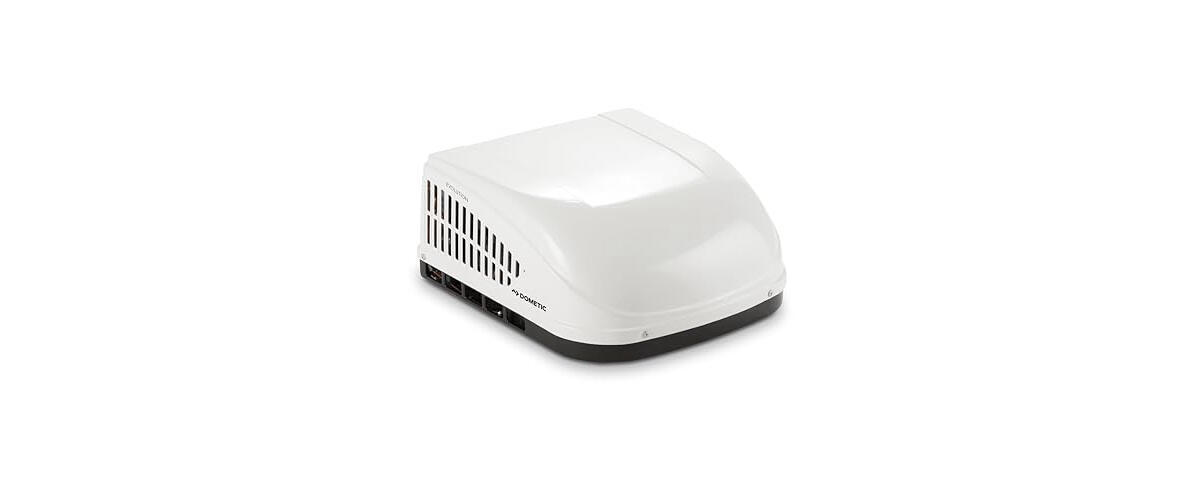

If you're looking for a high-efficiency RV air conditioner that can keep you cool even if the incoming power is below ideal conditions, the Dometic Brisk II Evolution Air Conditioner is a standout choice. With its impressive 11,000 BTU cooling capacity, this rooftop AC unit is perfect for RVs, trailers, and campers. Whether you have a ducted or non-ducted application, this polar white RV AC unit has got you covered. We loved its sleek and modern design, making it infinitely more appealing than other models on the market. Additionally, this air conditioner is known for its quiet operation, which is a huge plus when you're trying to relax and enjoy your camping experience.
Pros
Exceptional cooling power and airflow, EPP foam housing for lightweight design, Hassle-free setup
Cons
Does not come with remote controller

7 . ASA Electronics RV Air Conditioner – ACM 150B
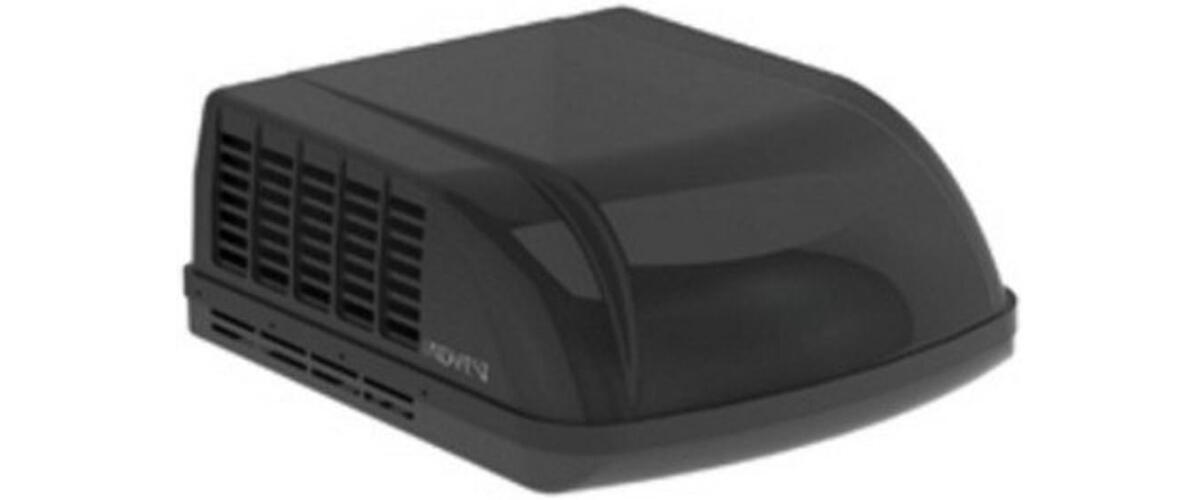

This is another budget-friendly option on our list. With a powerful 15,000 BTU capacity, this air conditioner is guaranteed to keep your RV cool and comfortable even on the hottest summer days. It quickly cools down your space, thanks to its high cooling capacity. The sleek black design adds a modern touch to any RV interior, making it ideal for those who value aesthetics. We also love that it features a built-in air distribution box, which ensures that the cool air is evenly distributed throughout the RV. Additionally, it is equipped with an easy-to-use digital thermostat that allows for precise temperature control. Overall, this air conditioner strikes the ideal balance between functionality and style.
Pros
Superior cooling capacity with 15, 000 BTU, Rigid frame construction, Versatile installation options
Cons
Larger and potentially heavier

FAQ
Q: How does altitude affect the efficiency of my RV air conditioner?
A: High altitudes can affect the efficiency of RV air conditioners due to thinner air, which reduces the air's heat-carrying capacity. This can lead to the compressor working harder, which might decrease its efficiency and cooling capacity. It's advisable to check if your unit needs any adjustments for high-altitude operation.
Q: Is it possible to run two RV air conditioners simultaneously?
A: It is possible to run two RV air conditioners simultaneously if your RV's electrical system can support the combined power draw and if you have a generator or shore power capable of handling the load. This setup is typical in larger RVs that need significant cooling power across multiple areas, providing you with ample cooling options for your comfort.
Q. Can RV air conditioners run on solar power?
A: Yes, RV air conditioners can run on solar power, but a substantial solar setup is required. You'll need enough solar panels to generate the required wattage, a large battery bank, and possibly an inverter to convert the power for AC use. It's important to calculate your energy needs accurately to ensure your system can handle the air conditioner's draw.
Q: How do I know if my RV air conditioner is compatible with my existing thermostat?
A: Compatibility depends on the model of both the air conditioner and the thermostat. Check the manufacturer's specifications for both products. If unsure, contacting the manufacturer or consulting with an RV technician can provide clarity and ensure compatibility.
Q: What are the signs that my RV air conditioner may need replacing?
A: Signs that you may need a new RV air conditioner include inadequate cooling, strange noises during operation, frequent cycling on and off, or a noticeable increase in energy consumption. If repairs are becoming frequent or costly, it might be more economical to replace the unit.
Article Contributors
Ctech Shopping Team
CTech's Shopping team brings you the latest in tech through carefully crafted reviews and guides, independent of their editorial team. As a reader-supported entity, our tech-savvy writers and editors sometimes incorporate AI in their analyses to verify the precision of product dimensions, availability, and pricing.
These product recommendations are designed to help you pick the best product for your needs.














